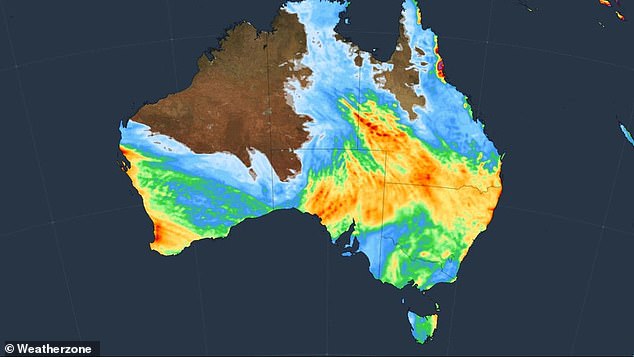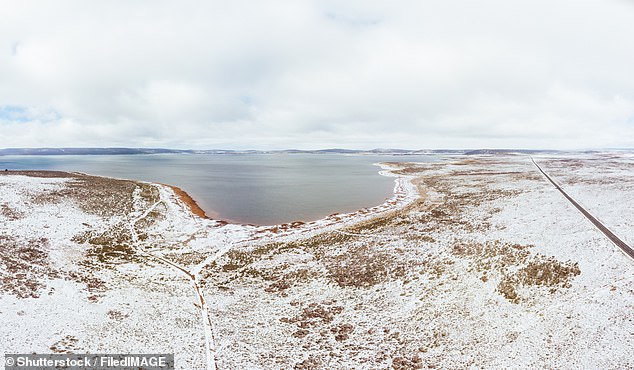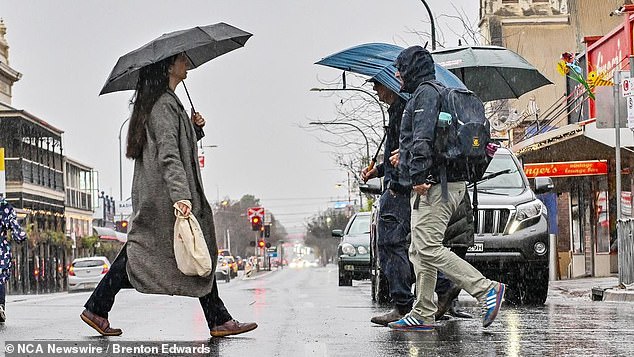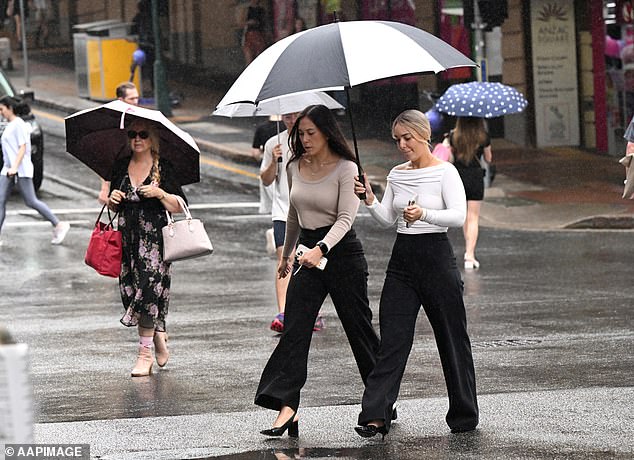Large parts of Australia are set to experience the heaviest rainfall of the season in the coming days, increasing the risk of flooding and road closures.
This follows Tasmania recording its second-coldest night on record at -13.5C, with Sydney and Brisbane set to be the wettest capital cities over the weekend.
Weatherzone is forecasting between 20mm and 60mm of rain across South Australia, southern and western Queensland and northern New South Wales over the next four days.
Clouds are already forming over central Australia and rain is expected to move eastwards from Sunday.
The downpour could represent “a season’s worth of rain”, Weatherzone predicted.
The rain is being driven by ‘an unusually strong high pressure system centred south of Australia which will cause moisture-laden air to flow over Australia from the east over the next few days’.
This airborne moisture, originating from unusually warm seas east of Australia, will collide with an isolated upper-level low pressure system as it passes over the country.
The interaction between the low pressure area and atmospheric moisture will cause abnormally heavy rainfall across a wide area of central and eastern Australia.
Large parts of Australia are set to be hit by a year’s worth of rain in the coming days, increasing the risk of flooding and road and rail closures. Women with umbrellas in photo

Weatherzone has forecast between 20 and 60mm of rain across South Australia, southern and western Queensland and northern New South Wales over the next four days. Weather map in image
Thunderstorms are forecast for Birdsville, Queensland, on Friday night and up to 20mm of rain on Saturday.
Bourke, New South Wales, is expected to see heavy rain and 30km/h winds on Sunday.
Gale warnings are in force for the south-west coast of Western Australia and strong wind warnings are in force for parts of the south coast of Australia.
Perth is expected to receive up to 35mm of rain between Tuesday and Wednesday.
The weather system will also bring a cold snap to parts of the Southeast.
The small town of Liawenee, on the central plateau of Tasmania, recorded the first -10 °C of the year in Australia on Tuesday, while bitter cold covered the southeast of the country.
On Wednesday morning, temperatures fell below -12.9°C, and on Thursday morning Liawenee recorded Tasmania’s second-coldest recorded temperature, a bone-chilling -13.5°C.
However, on Friday morning the temperature rose to -12.6 °C.
“Prior to this month, no weather station in Tasmania had recorded temperatures below -12.5°C during July,” Weatherzone reported.
‘However, that threshold has been exceeded three times this week.
‘While this week has not challenged Tasmania’s all-time record of -14.2°C set on 7 August 2020, this is the first time anywhere in the state has seen three mornings with temperatures below -12°C.’
Liawenee is famous for its trout fishing, but has a permanent population of only two people, one of whom is a police officer and the other is an officer of the Inland Fisheries Service.
Hopefully they will be warm and have central heating or a fire to keep them from freezing.
Canberra will be the coldest capital in the coming days, with temperatures below zero of -3°C on Saturday and -2°C on Sunday.
Hobart will be warmer, but not by much, with the minimum temperature in the Tasmanian capital ranging from 5°C on Saturday to 2°C on Monday.

The small town of Liawenee (pictured), Tasmania, recorded the state’s second-coldest temperature on record, a bone-chilling -13.5C on Thursday morning.

Sydney and Brisbane are set to be the rainiest capitals over the coming days, with showers expected throughout the weekend and early next week. Pictured are people with umbrellas
As is usual in the Australian winter, to get some sun you have to head to the Top End or Western Australia.
Perth will see highs of 20°C on Sunday and 21°C on Monday, but there will also be some cloud and rain.
In Darwin, it will be mostly sunny all weekend, with highs of 31°C on Friday, 32°C on Saturday and Sunday and 33°C on Monday.
Sydney and Brisbane are set to see the wettest capitals over the coming days, with showers expected throughout the weekend and early next week.
(tags to translate)dailymail


